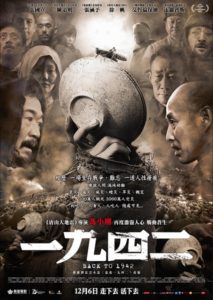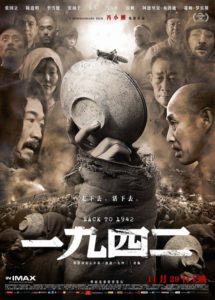Back to 1942
一九四二
China/Hong Kong, 2012, colour, 2.35:1, 144 mins.
Director: Feng Xiaogang 冯小刚.
Rating: 8/10.
Ironic, big-budget drama about a real-life famine in WW2 China defies expectations.
West Laozhuang village, Yanjin county, Henan province, north-central China, late 1942. Following a severe drought since the summer, Henan province is plagued by mass famine in the middle of the Sino-Japanese War. When he finds his property menaced by a large band of starving “bandits”, led by Sun Ciwei (Li Yixiang), wealthy landlord Fan Dianyuan (Zhang Guoli) throws a feast to placate them. However, violence breaks out and the property is looted and burned to the ground, and the landlord’s son killed during fighting. A Chinese Catholic priest, Brother Simeone (Zhang Hanyu), later berates Fan Dianyuan for his godlessness. Provincial governor Li Peiji (Li Xuejian), appointed by KMT generalissimo Jiang Jieshi [Chiang Kai-shek] (Chen Daoming), breaks the news to the people that he has come to collect more grain from them to feed the Nationalist Army, not to distribute grain to them. Landlord Fan and his family – including his mother (Liu Lili), pregnant wife and spoilt teenage daughter Xingxing (Wang Ziwen) – join the exodus from Yanjin westwards to Shaanxi province. Also joining them are his tenants – Xialu (Feng Yuanzheng), his sick mother, wife Huazhi (Xu Fan) and young daughter – and his loyal farmhand Shuanzhu (Zhang Mo). Meanwhile, in Chongqing,  central China, base of the KMT government, Time war correspondent Theodore H. White (Adrien Brody) hears about the Henan famine, which is downplayed to him by KMT cultural propaganda director Zhang Daofan (Zhang Chenguang). On the ninth day of the refugees’ exodus, governor Li Peiji is told by Nationalist Army general Jiang Dingwen that he’s under orders to commandeer grain supplies for his troops. Three weeks later, the refugees’ supplies are running low as they trudge through the snow, and Brother Simeone tries to take religious advantage of the situation. A former cook, Ma (Fan Wei), has also profited from the chaos and become a circuit-court judge, dispensing summary justice on the road. After arriving in Henan from Chongqing, Theodore H. White is warned by Irish priest Father Thomas Megan (Tim Robbins), who’s been in China for 30 years, not to journey into the famine area for his own safety, but provides him with a donkey and food when Theodore H. White insists. Generalissimo Jiang Jieshi issues orders to the army to abandon Henan province to the Japanese, who subsequently bomb the column of refugees and soldiers. On the 61st day of the exodus, Theodore H. White joins up with the refugees and later, back in Chongqing, tries unsuccessfully to get both the Chinese government and the US ambassador to listen to him. When first a local paper and then White publish stories about the famine, the situation initially looks like it may ease. But landlord Fan Dianyuan and his fellow refugees trudge on.
central China, base of the KMT government, Time war correspondent Theodore H. White (Adrien Brody) hears about the Henan famine, which is downplayed to him by KMT cultural propaganda director Zhang Daofan (Zhang Chenguang). On the ninth day of the refugees’ exodus, governor Li Peiji is told by Nationalist Army general Jiang Dingwen that he’s under orders to commandeer grain supplies for his troops. Three weeks later, the refugees’ supplies are running low as they trudge through the snow, and Brother Simeone tries to take religious advantage of the situation. A former cook, Ma (Fan Wei), has also profited from the chaos and become a circuit-court judge, dispensing summary justice on the road. After arriving in Henan from Chongqing, Theodore H. White is warned by Irish priest Father Thomas Megan (Tim Robbins), who’s been in China for 30 years, not to journey into the famine area for his own safety, but provides him with a donkey and food when Theodore H. White insists. Generalissimo Jiang Jieshi issues orders to the army to abandon Henan province to the Japanese, who subsequently bomb the column of refugees and soldiers. On the 61st day of the exodus, Theodore H. White joins up with the refugees and later, back in Chongqing, tries unsuccessfully to get both the Chinese government and the US ambassador to listen to him. When first a local paper and then White publish stories about the famine, the situation initially looks like it may ease. But landlord Fan Dianyuan and his fellow refugees trudge on.
REVIEW
Box-office magician Feng Xiaogang 冯小刚 has not always fared well artistically (The Banquet 夜宴, 2006; parts of Assembly 集结号, 2007) when straying from his forte of ironic comedy. But in Back to 1942 一九四二, a mega-budget (RMB200 million) portrayal of the famine in Henan province that claimed 3 million lives in the middle of the Sino-Japanese War, he gets the balance between spectacle, history, human characters and his trademark black humour just about right. Where his previous blockbuster, earthquake drama Aftershock 唐山大地震 (2010), was a very serious affair that tugged directly at the heartstrings, 1942, though dealing with a far bigger tragedy, takes an ironic approach that is more consistent with his overall body of work and makes the movie much more than just a war drama based on real events.
It’s a tricky act to treat such a subject in such a way, but Feng and scriptwriter Liu Zhenyun 刘震云, who first worked together on Feng’s 1995 TV drama Chicken Feathers Everywhere 一地鸡毛 and then on the contemporary satire Cell Phone 手机 (2003), manage it without seeming disrespectful. The inspiration came from Liu’s 50-page essay-cum-memoir Remembering 1942 温故一九四二 (1993), in which the Henan native tried to excavate his own family history and capture memories; written with Liu’s trademark irony (very similar to Feng’s), the essay was long thought unadaptable into a movie, having no plot or conventional characters or narrative. After two previous attempts, Feng and Liu finally succeeded, inventing a whole story from scraps in the essay which ambitiously attempts to combine the refugees’ exodus along with political events of the time – and even work into the mix real-life Time war correspondent Theodore H. White who first broke the story in the West.
White’s presence is justified by the major role he played in embarrassing the KMT government of Jiang Jieshi [Chiang Kai-shek] to acknowledge the problem (though not enough to really solve it). US actor Adrien Brody gives a reasonable facsimile of the passionate, 27-year-old journalist, without getting much of a chance to develop a real performance. Much more problematic is the presence of another US “name” to boost the film’s international profile: Tim Robbins’ extended cameo as a Catholic priest is both redundant to the plot and a distraction from the drama, and not helped by the actor’s wobbly (Oirish?) accent. In fact, the script’s incorporation of western religion into the story – largely to show how useless it was – makes similar scenes in The Flowers of War 金陵十三钗 (2011) look almost good: in particular, the Chinese priest of actor Zhang Hanyu 张涵予, inveighing against godlessness and then being stunned by the horrors of war, is marginally risible and a pointless diversion.
Aside from White’s character, the story of 1942 is a Chinese one, and Feng has assembled a first-rate cast heavy with regulars (actress wife Xu Fan 徐帆, comedian Fan Wei 范伟, actor Zhang Guoli 张国立, all in Cell Phone). They’re fine as various refugees, without being exceptional or stretching themselves very far, despite the film’s considerable physical challenges. The performance that lingers is that of veteran Chen Daoming 陈道明 (the emperor in Hero 英雄, 2002; the adoptive father in Aftershock) whose generalissimo Jiang Jieshi is a master-class in the power of minimalist acting, a man wrapped up in his own world, leading an utterly corrupt governing structure and out of touch with the country he purports to lead. Chen gets good support from other actors – notably fellow veteran Li Xuejian 李雪健 as Henan’s well-meaning provincial governor and Duan Yihong 段奕宏 as a KMT propaganda suit – but his is the really commanding performance of the whole movie.
Given the large number of characters and the concomitant need to perpetually cross-cut between the refugee exodus in Henan and the corridors of power in Chongqing, 1942 doesn’t often build a real head of dramatic steam. The eloquent but restrained music by veteran Zhao Jiping 赵季平 is a real help on the emotional side, especially during the bloody aftermath of a Japanese bombing of the refugee column an hour into the film. Unlike Aftershock, 1942 stays clear of melodrama, and keeps a detached, ironic eye on human behaviour: the endless bottom-line practicality of the Chinese under stress, the trading of anything from food to people, and the comic-tragic twists of fate on the refugees’ journey are all marbled with a rough, northern humour that could well escape non-Chinese (and especially average western) viewers.
On a technical level, the movie is very fine, with the widescreen photography by ace d.p. Lv Yue 吕乐 varying from bleak greys and icy whites to richer colours in urban scenes, while editing by Xiao Yang 肖洋 – clearly the result of boiling down much material – segues as smoothly as possible between the various plot strands. 1942 is not the last word in period blockbusters or movies about Chinese tragedies or human fortitude: it doesn’t pretend to be and, with its opening and closing narration (drawn directly from Liu’s original essay), makes clear its very specific goal. But for such a grim subject it’s not a hard sit or a downbeat one, or one that wallows in misery. It’s sharp, witty, moving and with memorable moments – and a real movie with people rather than an arid pamphlet on history.
CREDITS
Presented by Huayi Brothers Media (CN), Huayi Brothers International (HK). Produced by Huayi Brothers Media (CN), Huayi Brothers International (HK), Bon Voyage Film Studio (CN).
Script: Liu Zhenyun. Essay-memoir: Liu Zhenyun. Photography: Lv Yue. Editing: Xiao Yang. Music: Zhao Jiping. Production design: Shi Haiying. Art direction: Sun Li. Costume design: Ye Jintian [Timothy Yip]. Sound: Wu Jiang. Action: Sang Li (Chinese), Bak Ju-cheon (Koreans). Visual effects: Chang Hongsong, Jeong Do-an.
Cast: Zhang Guoli (Fan Dianyuan, landlord), Chen Daoming (Jiang Jieshi/Chiang Kai-shek, generalissimo), Li Xuejian (Li Peiji, Henan provincial governor), Zhang Hanyu (Brother Simeone), Fan Wei (Ma, cook), Feng Yuanzheng (Xialu, landlord’s tenant), Xu Fan (Huazhi, Xialu’s wife), Tim Robbins (Thomas Megan, priest), Adrien Brody (Theodore H. White), Li Qian (landlord’s daughter-in-law), Zhang Shaohua (Xialu’s mother), Wang Ziwen (Xingxing, landlord’s daughter), Zhang Mo (Shuanzhu, landlord’s farmhand), Zhao Yi (“little landlord”), Tian Xiaojie (Tian Xiaojie), Ke Lan (Song Meiling, Jiang Jieshi’s wife), Zhang Guoqiang (Guo Jijiao, 9th army commander), Yu Zhen (Wei Lihuang, general, director of Xi’an office of military affairs), Zhang Chenguang (Zhang Daofan, KMT cultural propaganda director), Lin Yongjian (Yue, county head), Duan Yihong (Chen Bulei, KMT deputy propaganda head), Liu Lili (landlord’s mother), Zhang Jiayi (Dong Jiayao, colonel), Yang Lixin (Ma Guolin, Henan provincial government secretary), Li Yixiang (Sun Ciwei, bandit leader), Su Youpeng [Alec Su] (Song Ziwen, foreign affairs minister), Zhang Zhijian (Zhang Fang, industrialist), Lv Zhong (Zhang Fang’s mother), Hou Yong (Gao), Luo Yang (Song Qingling, Sun Zhongshan’s widow), James A. Beattie (Clarence E. Gauss, US ambassador), Du Chun (Jiang Jieshi’s secretary), Qiao Zhenyu (Xiao Han, clerk), Yao Jingyi, Peng Jiale, Yuan Huifang, Zhang Shu.
Premiere: Rome Film Festival (Competition, Surprise Film), 11 Nov 2012.
Release: China, 29 Nov 2012; Hong Kong, 6 Dec 2012.
(Review originally published on Film Business Asia, 12 Nov 2012.)
